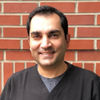Why is important to tell your dentist if you have an allergies
- kkhalilinejad

- Oct 27, 2025
- 3 min read

When it comes to maintaining optimal dental health, effective communication with your dentist is not just important, it is absolutely crucial. Among the myriad of details you should share, one of the most significant pieces of information pertains to any allergies you may have. By disclosing your allergies, you empower your dentist to make informed decisions that prioritize your safety and well-being. Understanding your specific sensitivities allows your dental professional to tailor treatment options that are not only safe but also most effective for your unique needs. For instance, certain anesthetics or materials used in dental procedures can trigger allergic reactions if you're sensitive to them. By openly discussing these aspects during your appointments, you help ensure that potential risks are mitigated and that the care you receive is personalized. Moreover, this proactive approach fosters a collaborative relationship between you and your dentist,one built on transparency and trust. It paves the way for more tailored treatment plans that consider not only the health of your teeth and gums but also any underlying conditions or sensitivities that could complicate standard procedures. Ultimately, being forthcoming about allergies can make a significant difference in both the comfort level during treatments and the overall success of dental care interventions. So remember, when it comes to safeguarding your smile and maintaining excellent oral health, don’t underestimate the power of open dialogue with your dentist about allergies; it’s an essential step towards achieving the best possible outcomes in your dental journey.
Allergies play a crucial role in determining the choice of materials utilized in various dental procedures, and understanding this impact is essential for both patients and practitioners. For example, if you have a known allergy to specific metals, such as nickel or cobalt, or to certain anesthetics used during dental work, it becomes imperative that your dentist is informed of these sensitivities. By doing so, your dentist can carefully select alternative materials that are hypoallergenic and will not provoke an adverse reaction. This proactive approach not only serves as a vital safeguard for your health and well-being but also enhances the overall experience during dental visits. Imagine walking into the dental office with peace of mind, knowing that every material used in your treatment has been meticulously chosen with your unique needs in mind. This attention to detail fosters trust between you and your dental care provider, allowing you to feel more comfortable throughout the process. Moreover, by prioritizing patient allergies when planning treatments, dentists can create a more inclusive environment that acknowledges individual differences and promotes better oral health outcomes. The ability to adapt procedures according to personal health profiles demonstrates an understanding of patient-centered care, an essential component of modern dentistry that ultimately leads to higher satisfaction rates among patients. Therefore, being open about any allergies not only protects you but also allows for an enhanced level of personalized care that benefits everyone involved in the treatment process.
Moreover, it is crucial to recognize that certain medications, particularly those prescribed for pain relief or infection control, can trigger allergic reactions in individuals who are sensitive or predisposed to such responses. This is not merely a theoretical concern; many patients have experienced severe allergic reactions that could have been easily avoided with proper communication. By disclosing your allergies and sensitivities upfront, you empower your dentist to make informed decisions about your treatment options. This proactive approach not only helps in selecting safer alternatives but also significantly reduces the risk of complications that could arise from an adverse reaction to a prescribed medication. Ultimately, clear and open communication fosters a more collaborative relationship between you and your healthcare provider, ensuring that your well-being remains the top priority throughout your dental care journey.
In summary, sharing any allergies you might have with your dentist is not merely a matter of caution; it represents a crucial step in securing personalized care that prioritizes both your safety and overall comfort during dental procedures. When you engage in open and honest communication regarding your health history, you empower yourself to take an active role in safeguarding your dental well-being. This proactive approach not only helps prevent potential allergic reactions to medications or materials used during treatment but also allows your dentist to tailor their methods and techniques specifically to meet your unique needs. By establishing this transparent dialogue, you create a partnership with your dental care provider, ensuring that every aspect of your treatment aligns with your health requirements and comfort levels. Ultimately, this investment in communication can lead to better outcomes and a more positive experience at the dentist's office, making it essential for anyone who values their oral health.




Comments